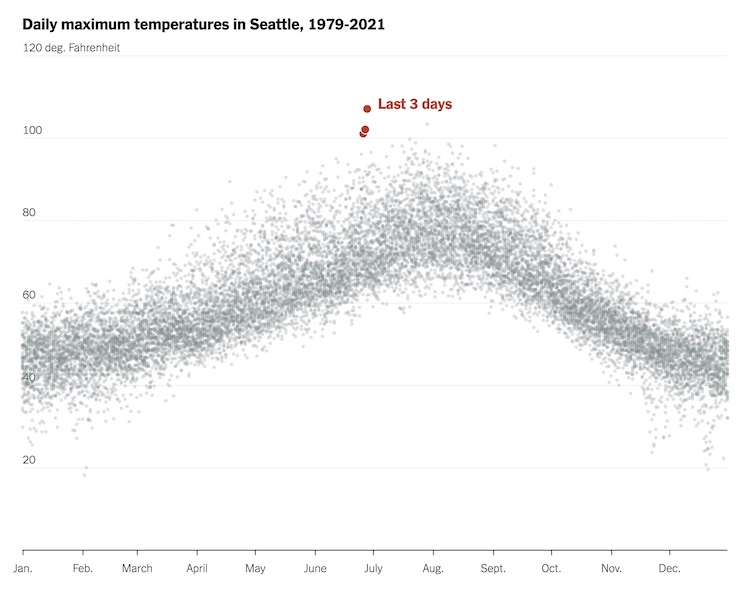Wednesday June 30, 2021
Seattle Is Burning
Well, that was hellish.
When I first arrived in Seattle in May 1991, I was taken aback by the weather. I grew up in Minneapolis where it would warm up in April, more in May and be superhot by June. And here it was in mid-June in Seattle and it was drizzly and in the 50s and maybe 60s. “When does it warm up here?” I asked a friend in late June.
“July 5,” he said.
I thought he was joking but it turned out to be a well-known Pac-Northwest saying. Saying? It was an axiom. Year after year, like clockwork, it kept coming true. The day after July 4, it was like God turned off the sprinkler, turned on the lights, and we had two months of beautiful, blue-skied, 75-degree weather. Tourists arrived from elsewhere to enjoy the temperate climate. We were a temperate people in a temperate land. When the sun came out you went out into it.
Those were the days.
Over the weekend Seattle suffered three straight days of 100+ degree temps and it's not even July. We broke our all-time record twice: Sunday, when it was like 104, and Monday when it was like 106 or 7 or 8. Portland suddenly became North Phoenix, with three straights days in the 110s. It was actually worse further north. Lytton, a village near British Columbia, became the hottest place in Canadian recorded history with a temperature of 116 on Sunday. The next day, it reached 118.
Here's Seattle's chart, via The New York Times:

And here's their explanation of the phenomenon:
The heat has resulted from a wide and deep mass of high-pressure air that, because of a wavy jet stream, parked itself over much of the region. Also known as a heat dome, such an enormous high-pressure zone acts like a lid on a pot, trapping heat so that it accumulates. And with the West beset by drought, there's been plenty of heat to trap.
And yes, Virginia (or Washington, or British Columbia), it's clmate change.
Making all of this worse is that Seattle is a city with few personal air conditioners. Normally we don't need them. Normally marine air is our air conditioner. So over the weekend, my wife and I did what we always did when I was a kid in Minneapolis during summer heat waves: We'd open the windows at night, close the windows and the blinds in late morning, and hope for respite. This worked for a day or so—and even then it'd still be in the 90s when we went to bed, so I'd be getting up at 1 or 2 AM to open windows. Monday was the worst. A normal summer morning in Seattle is in the high 50s or low 60s, but Monday at 6 AM it was still in the 80s and kept going up. There was no respite. When it reached 104 around 4 PM I took a walk around the block. Were we even doing it right? I wondered. Was it still hotter outside? Oh yes, it was still hotter outside. Opening the front door to our condo was like opening an oven set to 350. Even as I was walking around the block, the city was falling apart. Parts of I-5 buckled from the heat and several lanes had to be closed. I bought popsicles for Patricia at Bartell's and the box—all of the boxes—were stuck to the freezer from melting. At Trader Joe's yesterday, thick plastic shades were pulled over the dairy section to preserve the cool, while the entire freezer section had been emptied by staff because everything was thawing. In our pantry at home, the tub of thick coconut oil completely liquified.
Respite finally came Monday evening/early Tuesday morning. I went to bed at 10:30, when it was still 98, woke up an hour later when it was still in the 90s, read for a while. Before I went back to bed, I checked the temps again and they were in the 80s. When I opened the living window it felt less suffocating outside, so up went all of them. By the time I woke up at 6 AM it was legitimately cooler, closer to what we're used to. It felt great.
And not.
It won't last. And it doesn't bode well for wildfire season. And it's getting worse. Again, from The New York Times:

“We can say extreme weather is happening more as climate changes, and will continue to happen more,” said Erica Fleishman, director of the Oregon Climate Change Research Institute at Oregon State University. “This heat wave is extraordinary, but this in a sense is not likely to be the last.”
It's more than climate change, it's culture change. We're now looking at air conditioners. Our axioms are no longer true. They're not who we are.
Baseball's Active Leaders, 2023
What Trump Said When About COVID
Recent Reviews
Everything Everywhere All at Once (2022)
Black Panther: Wakanda Forever (2022)
Doctor Strange in the Multiverse of Madness (2022)
Spider-Man: No Way Home (2021)
The Cagneys
A Midsummer Night's Dream (1935)
Something to Sing About (1937)
Angels with Dirty Faces (1938)
A Lion Is In the Streets (1953)
Man of a Thousand Faces (1957)
Never Steal Anything Small (1959)
Shake Hands With the Devil (1959)







